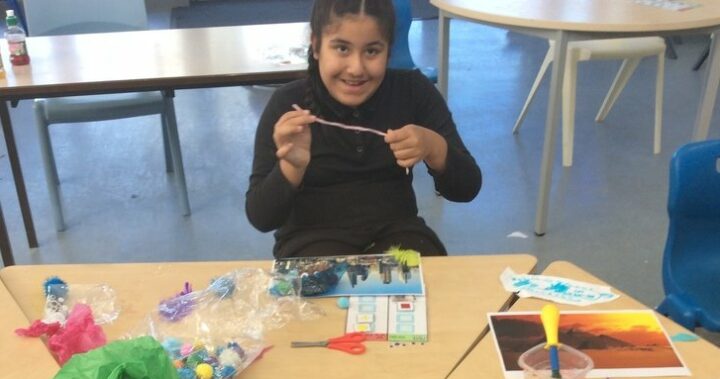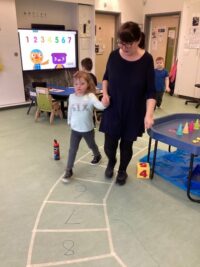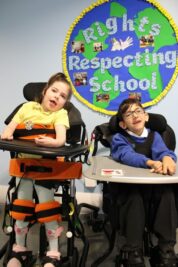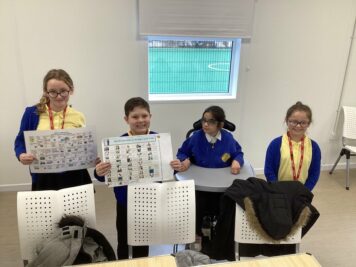Who is IQM?
IQM is the only national inclusion award in the UK. For over 20 years and in over 20 countries, schools, MATs and Local Authorities use the Inclusion Quality Mark to recognise exemplary inclusive practice.
Get in touch for your FREE school information pack today.
Millwood Primary Achieves Centre of Excellence
May 2, 2023
Millwood Primary School has achieved the Inclusive School Award with Centre of Excellence status.

Inclusion Permeates Into Every Aspect of School Life
The preparation Millwood Primary School had made for its IQM (Inclusion Quality Mark) assessment visit was detailed and meticulous, showing the embedded and ‘to hand’ nature of its inclusive daily provision. The staggering amount of evidence and clarity of systems used show a hardworking and confident team of staff, families and children with a drive to succeed, making sure that success is shared by all, especially their most vulnerable. The way the curriculum is structured is an inspiring example of inclusivity in action, with all learners accessing it at their own bespoke level. In fact, Millwood is a school where inclusion permeates into every aspect of school life.
The IQM leads were able to ensure that each part of the Millwood experience was observable during this assessment. The day contained a packed timetable where the children, teaching staff, Governing Body, support staff and leaders were all accessible. The thought put into this assessment day was a natural example of the thought put into all the work they do for their learners and their community. This is not through individuals excelling in certain areas in isolation but through a network of talent, experience and dedication, all encouraging each other to succeed. Leaders say they take the ‘temperature’ of all stakeholders in the way they ask for input and this is clear in the consideration taken into areas such as classroom design, curriculum creation and targeted career path development.
‘Calm and Adaptive Environment’

The first meeting with parents and carers was very illuminating, as they were incredibly informed, included and motivated to explain their experiences. They explained the collaborative approach at Millwood. They elaborated on the three-tiered curriculum development and their children’s place within the system; how it allowed each child to take a full part in a themed curriculum and have success at each part of the process. They described it as a ‘calm and adaptive environment’ in which their children thrive.
Parents spoke of the detail and care taken when children enter the school, both on arrival in the morning and when transitioning from other settings. They felt there was always time to speak to staff, discuss concerns and share vital information. The family walks have brought them together as a school community and they feel the provision and signposting to other agencies or towards a range of differing help is excellent. It’s clear that the parents and carers see Millwood as a school which joins up support, links to teams such as the nursing team within school and shares information carefully and consistently. There was an immediate sense of unity and clarity from the first moments in these interviews all the way through to the final meetings.
Governors have a great deal of valuable experience, ideas and understanding of their roles. They are passionate about the school, and they are wonderful examples and advocates for Millwood. They have a diversity of experience that adds to the creativity and skillsets of those they support. They have an open forum to challenge leaders and work well with them. They check in with staff to ensure they have the tools to succeed but also to check on their happiness and wellbeing. They have a lived experience of all areas of the school and are always working diligently to enhance the learning experience.
They appreciate when staff adapt to ensure each child accesses plays, shows and gets the opportunity to be ‘centre stage’. Our Assessor heard a wonderful story about a fully inclusive assembly where all children, regardless of their place on their communication journey, were celebrated and included. The positive impact on parents when seeing their children in this context, was noted and Governors work hard to ensure the daily experience of the children mirrors this.
Learning Walk Was a Delight
The learning walk was a delight, considering the children had been outside for a fire alarm earlier, they settled back to work wonderfully. It was clear that the adults they work with and their sense of wherever the adults were, the children felt safe and cared for. Each class had a neutral, well organised and clear learning space, with no wasted motion of staff ensuring a 100% focus on the children and their experience in the moment. There were lots of lovely appropriate and engaging learning resources, where everything observable was practical and interactive at the point of need.
During the learning walk it was evident that ongoing building work on the school was carefully considered in terms of the children’s lived experience. The deployment of resources such as sensory circuits outside of the classroom help alleviate any stresses and aid movement/transitions around school or even just between activities. Classrooms clearly avoided ‘visual clutter’ and the training on understanding visual needs as well as all sensory need is applied as a matter of necessity and with passionate excitement by staff. They clearly love providing new, creative and individualised resources and strategies for their children. Classes use their themes well, children may cover a topic through maths, Religious Education (RE) or design all at the same time, with different learners and staff deployed expertly.

Staff understand the challenges of their roles and it is noteworthy how much preparation is made by leaders after collaborating with all levels of staff and then putting support into action. For example, Bereavement Support has a weekly plan to ensure everyone is cared for and considered. Staff and children are confident and safe in this environment, and this is continually measured and adapted.
Leaders explained the reassessment of training within school, how they all use their ‘Unconditional Positive Regard’ approach to everyone in the school family and consider what they want and need in relation to their own training and how new systems are implemented. Leaders do this by measuring how ‘workable’ tasks are, taking the ‘temperature’ of feeling and having open conversations with staff and children when addressing the need to change.
These choices by leaders help nurture a deep-seated trusting culture within school where children are open to trying new things and staff are too. Building confidence in others is a vital core value that was on display during this assessment. Therefore, training and career development becomes shared and embedded rather than a day on a course with no real benefit.
Children Fully Engaged
The children were fully engaged, and everything was in place for each child to access learning made especially for them. There was the perfect amount of uniformity, individual creative ideas and personality of the class teams, in each room so that everyone was buying into the learning. Children were confident to introduce themselves as they were in a warm, safe environment with trusted adults. They are proud of their progress because of the value staff and parents give to this. It is inspiring to see!

Senior Leaders have a healthy and realistic view of their roles, they have a humanistic approach and don’t see themselves as ‘the finished article’ – this is not to say they do not have an incredible level of support and success.
All staff trust leaders to have both the children and the staff’s best interests at heart. They are open to approach, in a kind and thoughtful way. They take part in regular ‘check-ins’ to ensure everyone is able to provide the best provision for the children and to make sure everyone on the ‘Millwood bus’ is cared for.
They constantly work hard to keep lines of communication open at all levels and listen to ideas thoughtfully and always give ideas value. The leadership team is visible, involved, has a range of backgrounds and experiences which is also reflected in the staff team they have cultivated. There is a range of skillsets and advocacy for each other and they distribute leadership in a way that builds each other up and sets the example for middle leaders, teaching assistants and teachers who all support and advocate for each other similarly.
Love and Passion for the Ethos of the School
Teachers who were interviewed, were motivated, open and also from a range of backgrounds, but celebrated equally and able to grow and develop under the Millwood banner. Teachers spoke of personal needs being addressed and workload being considered by sharing of resources, ideas and open professional dialogue. They describe leaders as available and speak with love and passion for the ethos of the school and their pride in the children. They have a deep understanding of issues parents/ carers may have, are sensitive and open to working with others to help parents assimilate on arrival to the school and also help them through friendly and professional communication.

New staff have been fortunate to come into a culture of support, therefore mentors are commonplace in many areas beyond those initial first years. The peer group of teachers is supportive, and they encourage each other by asking for specific support in areas they know their colleagues excel in. Their mental health can be supported beyond the leadership team and peers with signposting made clear to all members of staff.
Pressures are considered and interests and motivations of individuals are valued and discussed, with a natural openness constantly valued at all levels. Staff feel the systems are so clear that it helps their job become easier, for example the school Family Support Worker is ingrained in the school culture and is always available to provide a bridge between home and school. All staff look for ‘small wins’ every day – for the children, to share with families and with each other. Teachers are eager to compliment other staff and are a vital part of the ‘community building’ observable throughout the school.
Trusting Culture of Millwood
Such is the confidence of staff and how they are valued, Teaching Assistants take on roles of leadership and support others through their constant team-focused approach. They help support and train new staff and aid each other. They have an important voice related to their own career development, but they also support others around them with no judgement attached. They understand and take pride in helping to rebuild or build confidence in others and know they are vital when building bonds within class and whole school teams.
The group interviewed acutely understand the ecosystem of the school and has the flexibility and expertise to do what is needed to keep the consistency and provide the continued care the children need. They feel emboldened to challenge areas they think need developing and are happy to hear that about their own work too. This again, is only possible because of the respect they have for each other and the trusting culture of Millwood.

Millwood is a school with a strong sense of their values and successes. They are looking confidently to the future. They can do this with clarity as they truly take the time and take care to understand each other, learners, families and their own roles. They prioritise individualising experiences and that importantly includes the individuals who work there also. Staff feel cared for and supported in a genuine way and our Assessor is of the opinion that the school fully meets the standard required by the Inclusion Quality Mark‘s Inclusive School Award.
They are excited to take a place within the IQM network of schools and already want to utilise other settings to further develop their inclusive approach to coaching and mentoring.
Find out more about the IQM Inclusive School Award
If your school is interested in obtaining the IQM Inclusive School Award or you wish to talk to a member of the IQM team please telephone:
028 7127 7857 (9.00 am to 5.00 pm)
or email: info@iqmaward.com for further details.
Want more information on the IQM Award? Click here to request your free IQM information pack.
Other Posts

About IQM
The only national award for inclusion in the UK, IQM has been committed to recognising exemplary inclusive schools for over 20 years and in over 20 countries around the world. The three awards allow schools and organisations to celebrate their inclusive practice against nationally recognised framework.
Site Links
© 2026 Inclusion Quality Mark | website developed & cared for by digidoda


